Peter Attia in peterattiamd.com:
 When it comes to fat loss, most of us need all the help we can get. With the modern American lifestyle being largely sedentary and characterized by easy access to highly palatable, energy-dense foods, it can be very difficult to maintain the calorie deficit necessary to lose fat and keep it off. Whether or not a calorie deficit is achieved is determined by the difference between total energy in and total energy out. Assessing the “energy in” side of the equation is straightforward—add up the energy content of all food consumed. However, the “energy out” side is more complicated and much more difficult to accurately measure, as it varies by body composition, activity level, age, sex, and various other factors.
When it comes to fat loss, most of us need all the help we can get. With the modern American lifestyle being largely sedentary and characterized by easy access to highly palatable, energy-dense foods, it can be very difficult to maintain the calorie deficit necessary to lose fat and keep it off. Whether or not a calorie deficit is achieved is determined by the difference between total energy in and total energy out. Assessing the “energy in” side of the equation is straightforward—add up the energy content of all food consumed. However, the “energy out” side is more complicated and much more difficult to accurately measure, as it varies by body composition, activity level, age, sex, and various other factors.
One component of total daily energy expenditure (TDEE) is the energy required to digest and metabolize food, termed the “thermic effect of food,” or “diet-induced thermogenesis” (DIT). DIT can account for ~10% of total energy expenditure, but some foods require greater energy input to digest and metabolize than others. Among macronutrients, protein is by far the least efficient source of energy—roughly 25% of the available energy in protein is expended just metabolizing it, which is more than double the amount of available energy required by carbohydrate, fat, or alcohol metabolism.1,2 This raises the question: can we leverage higher protein intakes to increase total energy expenditure enough to make a meaningful difference for fat loss?
More here.
Enjoying the content on 3QD? Help keep us going by donating now.

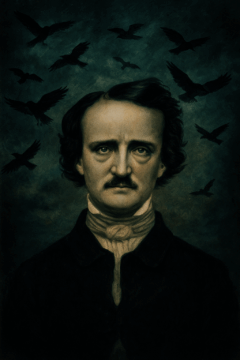 Next to an abiding interest in biology, I also have a penchant for the gothic, and a version of the collected works of Edgar Allan Poe naturally can be found in my library. But beyond the author of The Raven, who was Poe? One man who can tell me is Richard Kopley, a Distinguished Professor of English, Emeritus, at the Penn State DuBois campus of Pennsylvania State University. When this biography was published back in March, I made a mental note to revisit it for Halloween. Though my background is in biology, Kopley fortunately wants to provide for a broad readership, including “the general reader, the aficionado, and the scholar”, the goal being to “get as close to Poe as I can for as many readers as I can” (p. 4). Thus, for the last 21 days, I have immersed myself in this detailed and deeply researched biography to read of a life that was both captivating and tragic.
Next to an abiding interest in biology, I also have a penchant for the gothic, and a version of the collected works of Edgar Allan Poe naturally can be found in my library. But beyond the author of The Raven, who was Poe? One man who can tell me is Richard Kopley, a Distinguished Professor of English, Emeritus, at the Penn State DuBois campus of Pennsylvania State University. When this biography was published back in March, I made a mental note to revisit it for Halloween. Though my background is in biology, Kopley fortunately wants to provide for a broad readership, including “the general reader, the aficionado, and the scholar”, the goal being to “get as close to Poe as I can for as many readers as I can” (p. 4). Thus, for the last 21 days, I have immersed myself in this detailed and deeply researched biography to read of a life that was both captivating and tragic.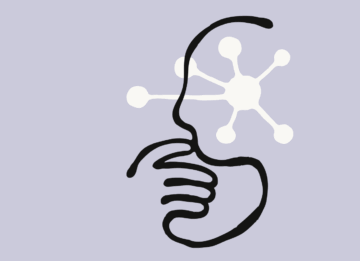 Have you ever asked an AI model what’s on its mind? Or to explain how it came up with its responses? Models will sometimes answer questions like these, but it’s hard to know what to make of their answers. Can AI systems really introspect—that is, can they consider their own thoughts? Or do they just make up plausible-sounding answers when they’re asked to do so?
Have you ever asked an AI model what’s on its mind? Or to explain how it came up with its responses? Models will sometimes answer questions like these, but it’s hard to know what to make of their answers. Can AI systems really introspect—that is, can they consider their own thoughts? Or do they just make up plausible-sounding answers when they’re asked to do so? As Benjamin wrote in 1928, in his sprawling and unfinished magnum opus
As Benjamin wrote in 1928, in his sprawling and unfinished magnum opus 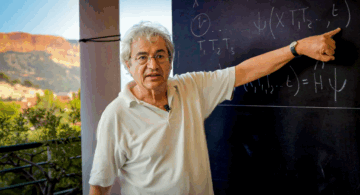 Sitting outside a Catholic church on the French Riviera, Carlo Rovelli jutted his head forward and backward, imitating a pigeon trotting by. Pigeons bob their heads, he told me, not only to stabilize their vision but also to
Sitting outside a Catholic church on the French Riviera, Carlo Rovelli jutted his head forward and backward, imitating a pigeon trotting by. Pigeons bob their heads, he told me, not only to stabilize their vision but also to 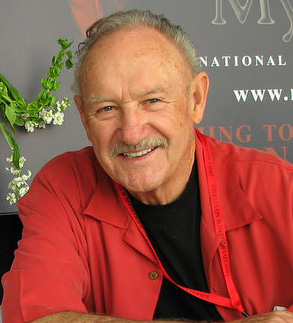 G
G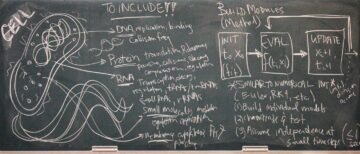 A human cell swarms with trillions of molecules, including some 42 million proteins and a plethora of carbohydrates, lipids, and nucleic acids. Crowded with organelles and other structures, the cell boasts an intricate organization that makes baroque architecture seem plain. Its cytoplasm is a frenzied chemical lab, with molecules continuously reacting, rearranging, and reshaping. In the nucleus, thousands of genes are constantly switching on and off to turn the seeming chaos into concerted actions that help the cell survive and reproduce.
A human cell swarms with trillions of molecules, including some 42 million proteins and a plethora of carbohydrates, lipids, and nucleic acids. Crowded with organelles and other structures, the cell boasts an intricate organization that makes baroque architecture seem plain. Its cytoplasm is a frenzied chemical lab, with molecules continuously reacting, rearranging, and reshaping. In the nucleus, thousands of genes are constantly switching on and off to turn the seeming chaos into concerted actions that help the cell survive and reproduce.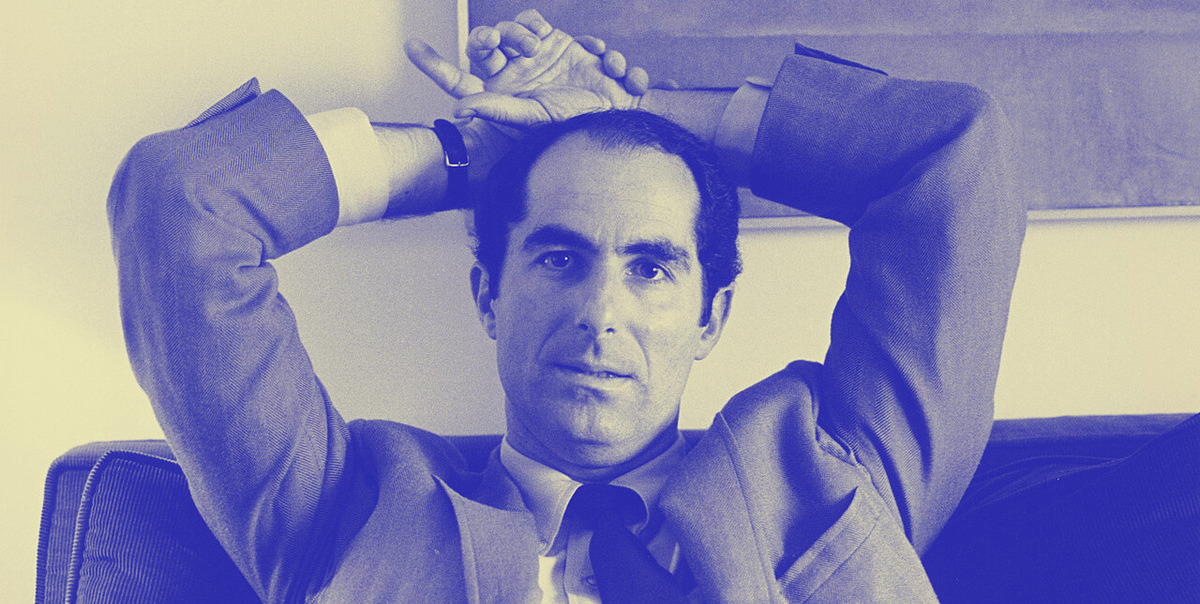 Already in 1967, the same year When She Was Good came out, the first samples of Portnoy’s Complaint were issued in wide-circulation magazines like Esquire and Sport, as well as the highbrow Partisan Review. Indeed, it was there, in that mainstay of the New York intelligentsia, that Roth signaled his departure from the magazine’s austere norms with the chapter entitled “Whacking Off.” Solotaroff’s new paperback journal New American Review ran two excerpted chapters of the novel, the first almost two years before the book’s appearance, the second numbering no fewer than twenty-eight thousand words.
Already in 1967, the same year When She Was Good came out, the first samples of Portnoy’s Complaint were issued in wide-circulation magazines like Esquire and Sport, as well as the highbrow Partisan Review. Indeed, it was there, in that mainstay of the New York intelligentsia, that Roth signaled his departure from the magazine’s austere norms with the chapter entitled “Whacking Off.” Solotaroff’s new paperback journal New American Review ran two excerpted chapters of the novel, the first almost two years before the book’s appearance, the second numbering no fewer than twenty-eight thousand words. The potential for AI to improve weather forecasting and climate modelling (which also takes a long time and uses a lot of energy)
The potential for AI to improve weather forecasting and climate modelling (which also takes a long time and uses a lot of energy)  As someone who has spent decades studying the evolution of nuclear energy, I’ve seen its emergence as a promising transformative technology, its stagnation as a consequence of dramatic accidents and its current re-emergence as a potential solution to the challenges of global warming.
As someone who has spent decades studying the evolution of nuclear energy, I’ve seen its emergence as a promising transformative technology, its stagnation as a consequence of dramatic accidents and its current re-emergence as a potential solution to the challenges of global warming.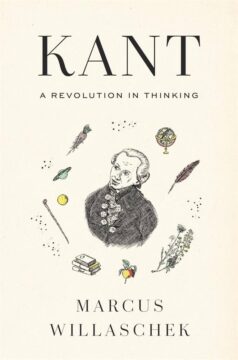 The central insight that these disparate thinkers took from Kant is that the world isn’t simply a thing, or a collection of things, given to us to perceive. Rather, our minds help create the reality we experience. In particular, Kant argued that time, space, and causality, which we ordinarily take for granted as the most basic aspects of the world, are better understood as forms imposed on the world by the human mind.
The central insight that these disparate thinkers took from Kant is that the world isn’t simply a thing, or a collection of things, given to us to perceive. Rather, our minds help create the reality we experience. In particular, Kant argued that time, space, and causality, which we ordinarily take for granted as the most basic aspects of the world, are better understood as forms imposed on the world by the human mind. Horror is ubiquitous on TV at this time of year, and those of us who love a good scare—myself very much included—usually look forward to it. Unfortunately, October 2025’s selection of IP expansions (
Horror is ubiquitous on TV at this time of year, and those of us who love a good scare—myself very much included—usually look forward to it. Unfortunately, October 2025’s selection of IP expansions (